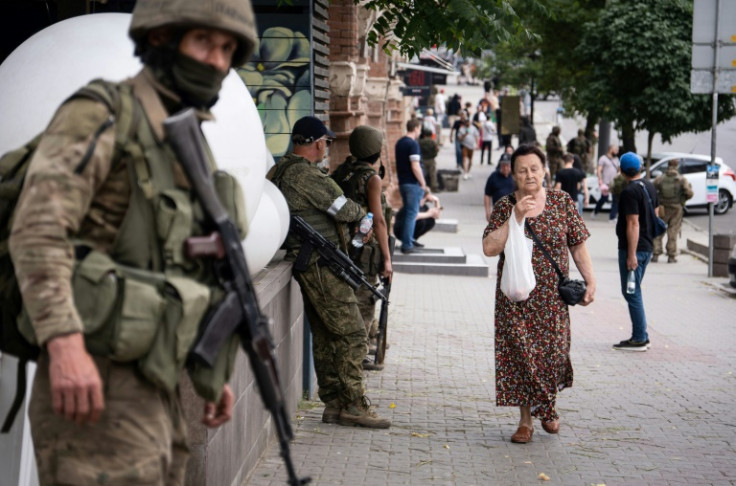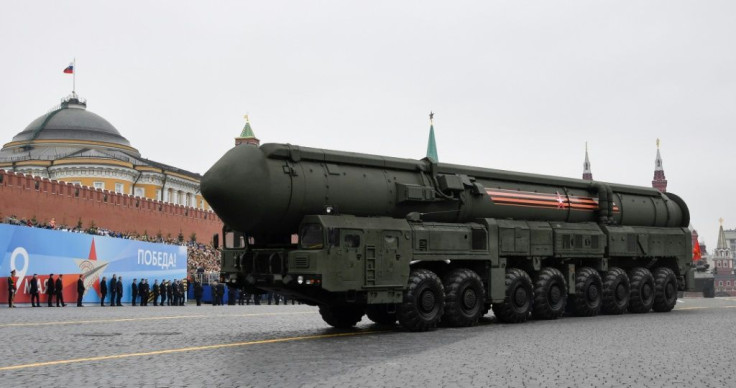Here's What Would Happen If Wagner Seized Russia's Nuclear Weapons, According To Experts

KEY POINTS
- A Harvard researcher said the Wagner Group could have used captured nuclear weapons as political leverage
- A former diplomat expressed concern over the security of Russian nuclear weapons
- Experts believe mercenaries could not quickly use Russian nuclear weapons
The short-lived mutiny of the Russian paramilitary organization Wagner Group against the Russian military establishment raised concern among experts regarding Moscow's control of its nuclear weapons.
Some experts told the Bulletin of the Atomic Scientists that the instability created by the Wagner Group's rebellion could lead to a nuclear disaster in Russia and jeopardize global stability.
Alexander Vershbow, a former NATO deputy secretary general and U.S. ambassador to Russia, said "the world [would] find itself in uncharted territory" if mercenaries succeed in gaining control over some of Russia's nuclear weapons.
"It is doubtful that the ousted Putin regime would be able to withhold access to nuclear codes for very long, if at all," Vershbow said, referring to Russian President Vladimir Putin.
If the Wagner mercenaries were able to seize Russian nuclear weapons, they "could have used the captured weapons as political leverage in the short term," Mariana Budjeryn, a senior research associate with the Project on Managing the Atom at Harvard University, told the outlet.
The move of the Wagner Group last weekend also reignited an old fear among U.S. officials that Russian nuclear weapons might fall into the wrong hands.
"The security of then-Soviet nuclear warheads was a major US concern during and immediately following the Soviet Union's collapse," Steven Pifer, a former U.S. ambassador to Ukraine, said.
When the Wagner Group marched into Russian territory over the weekend, one nuclear storage facility was on the mercenaries' path, according to Budjeryn.
"At least one facility that could house Russian weapons was on the mutineers' path to Moscow: Voronezh-45 central nuclear storage facility," Budjeryn said.
But the expert noted that it remains unknown whether the facility currently hosts Russian nuclear weapons.
While a Russian nuclear facility was on the Wagner Group's path during their mutiny, experts said they believe the mercenaries would not have been able to quickly arm or use the country's nuclear warheads.
Pifer noted that most of the stored Russian tactical nuclear warheads "are not fully assembled."
Pavel Podvig, the director of the Russian Nuclear Forces Project, said in a blog post that Wagner fighters would have to go through complex deployment procedures before they could use any Russian nuclear weapons.
However, should a military coup ever succeed in Russia and gain control over the country's nuclear arsenal, the challenge for world leaders is to warn coup leaders of "the severe consequences of using or threatening to use nuclear weapons," Vershbow said.
Vershbow added that the international community should pressure new Russian leaders to "establish effective security controls" over nuclear weapons and "renounce nuclear coercion."
Despite the failure of the Wagner-led rebellion to gain momentum, the former NATO official doesn't believe "Russia has seen the last of Yevgeny Prigozhin," the Russian oligarch who heads the private military group.
Prigozhin launched Wagner's "march for justice" Friday to protest the Russian military's alleged missile strike against his mercenary fighters in Ukraine.
But merely 24 hours after launching a mutiny against the Russian military leadership, Prigozhin's mercenary forces agreed to stand down after a deal was brokered between them and the Kremlin.
Kremlin spokesperson Dmitry Peskov confirmed the agreement Saturday evening, stating that all criminal charges against Prigozhin would be dropped.

© Copyright IBTimes 2025. All rights reserved.






















